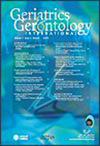Development of the Japanese Anticholinergic Risk Scale: English translation of the Japanese article
Abstract
Background
Anticholinergic burden, reflecting the cumulative impact of medications with anticholinergic properties, significantly predicts adverse drug reactions and geriatric syndromes in older adults. Although anticholinergic risk scales (ARS) have been developed and validated in various countries, none have been tailored specifically for Japan. The Japanese Anticholinergic Risk Scale (JARS) was developed to adapt the existing ARS frameworks to the Japanese context, considering unique medication profiles and cultural factors.
Process
First, a systematic review was performed to follow the protocol registered in PROSPERO (CRD42017076510). A PubMed search from October 2017 to March 2023 was conducted to identify ARS publications post-September 2017. Based on two algorithms, average scores from the existing scores were used to develop JARS. The Delphi method, an expert consensus approach, was applied to determine the scores for medications that were not established by the algorithms. Sixteen articles identified in our systematic review contributed to JARS development. JARS categorizes 158 medications into three potency groups: 37 drugs scored as 3 (strong), 27 as 2 (moderate), and 94 as 1 (weak).
Conclusion
JARS, the newly developed ARS, could be a critical tool for anticholinergic burden assessment in older Japanese populations. Developed through a systematic review and Delphi-based expert consensus, it encompasses 158 medications, offering a comprehensive anticholinergic burden assessment. Future studies and updates should be conducted to improve the accuracy and clinical applicability of this scale. Geriatr Gerontol Int 2025; 25: 5–13.


 求助内容:
求助内容: 应助结果提醒方式:
应助结果提醒方式:


